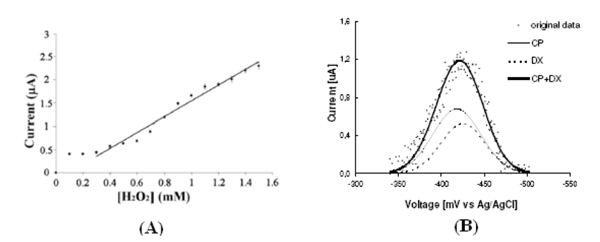Go to
Nano-bio-chip technologies
Enabling Nano-Bio-Chip Technologies for Sensing Applications
- Principal Investigator: Dr. Sandro Carrara (EPFL-IC-ISIM-LSI)
Overview:
In this project, new enabling micro/nano/bio-technologies toward the development of all-on-chip systems for on-line bio-monitoring have been explored for applications in: diagnosis, treatment of patients, cell cultures and environmental monitoring. The project comprises of three main research tasks: Nano-Bio films for applications in stem cells monitoring, Nano-Bio films for drugs detection, and innovative ideas in VLSI design for bio-applications.

Figure (A): Improved sensitivity registered by using CNTs on peroxide detection Figure (B): Improved sensitivity registered by using CNTs on drugs detection.
Main Results on Nano-Bio-Chip for Stem Cells Monitoring
Nano-biosensing provides new tools to investigate cellular differentiation and proliferation. Among the various metabolic compounds secreted by cells during their life cycle, glucose, lactate and hydrogen peroxide (H2O2) are of main interest. Glucose is the “fuel” of cells while lactate and hydrogen peroxide production is related to cell suffering. Nano-structured electrodes may enhance the compound sensitivity in order to precisely detect cell cycle variation. In this research task, the detection with electrodes structured by using multi-walled carbon nanotubes (CNT) have been investigated to be considered for an amperometric biochip. A significant improvement in sensitivity has been achieved, indicating that carbon nanotubes are the right candidates to improve biosensing, as shown by figure 1(A). Also, first experiments on glucose and lactate detection in stem cells have been carried out. Future projects originated by this study will be on the development of bio-chips to be integrated in petri dishes for automatic stem cell culture monitoring.
Main Results on Nano-Bio-Chip for Drugs Detection
Personalized therapy requires accurate and frequent monitoring of drugs metabolic response in living organisms during drug treatments. In case of high risk side effects, e.g. therapies with interfering anti-cancer molecules cocktails, direct monitoring of the patient’s drug metabolism is essential as the metabolic pathways efficacy is highly variable on a patient-by-patient basis. Moreover, anti-cancer pharmacological treatments are often based on cocktails of different drugs. Currently, there are no fully mature biochip systems to monitor multi-panel drug amounts in blood or in serum. The aim of this task has been to investigate the complexity of multiple drugs detection for point-of-care and/or implantable systems to be used in personalized therapy. Probes investigated for biochips are the P450 cytochromes as they are key-role proteins in drugs metabolism. Multiple drugs detection has been carried out both by simulations and electrochemical experiments. Three different P450 isoforms (2C9, 3A4, and 2B4) have been considered to detect nine different commonly used drugs. Drugs specificity enhancement has been investigated considering components decomposition of peak in registered cyclic voltammetry, as shown in figure 1(B). CNT have also been investigated as electron transfer promoters to enhance detection sensitivity (ref. 2).
Publications
1. Cristina Boero, Sandro Carrara and Giovanni De Micheli, Sensitivity Enhancement by Carbon Nanotubes: Applications to Stem Cell Cultures Monitoring, in press in the proceedings of IEEE/PRIME 2009, 5th Conference on PhD Research in Microelectronics and Electronics, Cork, Ireland.*
2. Sandro Carrara, Andrea Cavallini, Abhishek Garg, Giovanni De Micheli, Dynamical Spot Queries to Improve Specificity in P450s based Multi-Drugs Monitoring, proceedings of the IEEE/ICME International Conference on Complex Medical Engineering, April 9-11, 2009, Tampe, Arizona, U.S.A.
3. Cristina Boero, Giovanna De Vecchi, Sandro Carrara, Laura Calzà, and Giovanni De Micheli, In Vitro Monitoring of Strem Cells Metabolism, in preparation for Nature Biotech
4. Sandro Carrara, Andrea Cavallini, Giovanni De Micheli, P450 Drugs detection: potentialities and limitations of a new nano-bio-technology, in preparation for Biosensors and Bioelectronics
*Gold Leaf Prize for best presented paper at the 5th IEEE/PRIME Conference on PhD Research in Microelectronics and Electronics, Cork, Ireland, in July 2009
